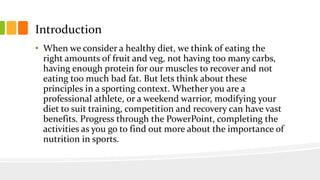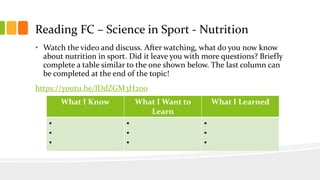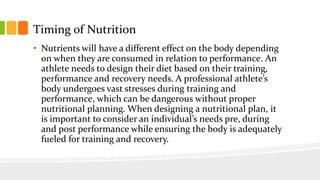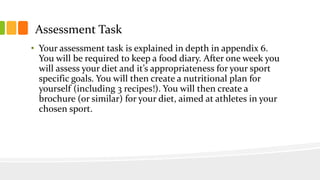Nutrition in Sports unit
- 1. Nutrition in Sport Stage 6 PDH/PE
- 2. Outcomes H8 âĒ explains how a variety of training approaches and other interventions enhance performance and safety in physical activity H11 âĒ designs psychological strategies and nutritional plans in response to individual performance needs H17 âĒ selects appropriate options and formulates strategies based on a critical analysis of the factors that affect performance and safe participation Learn About Learn To âĒ Energy Systems (Alactic Acid, Lactic Acid & Aerobic) âĒ Analyse each energy system (main source of fuel) âĒ Nutritional considerations (pre, during & post performance. Including carbohydrate loading) âĒ Compare dietary requirements of athletes in different sports pre, post and during performance âĒ Supplementation (vitamins & minerals, protein, caffeine and creatine) âĒ Critically analyse evidence for and against supplementation for improved performance âĒ Recovery strategies (hydration) âĒ Research recovery strategies to discern their main features and proposed benefits to performance
- 3. Introduction âĒ When we consider a healthy diet, we think of eating the right amounts of fruit and veg, not having too many carbs, having enough protein for our muscles to recover and not eating too much bad fat. But lets think about these principles in a sporting context. Whether you are a professional athlete, or a weekend warrior, modifying your diet to suit training, competition and recovery can have vast benefits. Progress through the PowerPoint, completing the activities as you go to find out more about the importance of nutrition in sports.
- 4. Reading FC â Science in Sport - Nutrition âĒ Watch the video and discuss. After watching, what do you now know about nutrition in sport. Did it leave you with more questions? Briefly complete a table similar to the one shown below. The last column can be completed at the end of the topic! https://youtu.be/lDdZGM3H2o0 What I Know What I Want to Learn What I Learned âĒ âĒ âĒ âĒ âĒ âĒ âĒ âĒ âĒ
- 5. Hydration âĒ Click on the link below. âĒ Read and summarise the information. âĒ Complete the âHydrationâ worksheet (appendix 1). https://www.ausport.gov.au/ais/nutrition/fact_sheets/fluid_-_who_needs_it
- 6. Sports Drinks âĒ How many different types of sports drinks can you think of? Research and compare three (3) different sports drinks. Choose which one of the three would be most suitable for an Olympic track athlete. Justify your response. âĒ Consider the following questions as starters for your task; i. Do they provide effective hydration? ii. Are they considered healthy? Why/Why not? iii. Do the marketing campaigns for each drink have a specific target audience? iv. Is the target audience appropriate?
- 7. Macro & Micro Nutrients Become an expert! âĒ Form a group of four people and allocate each member a different topic (protein, carbohydrates, fats and vitamins & minerals) âĒ You have 10-15 minutes to find out as much as you can about your topic. Use the provided worksheets to start. âĒ You may research your topic in more depth if you wish! (remember to use reliable sources of information) âĒ Now, you have 5 minutes each to teach the rest of your group everything they need to know about your topic. âĒ Extension: Now choose a topic you just learned about (not your expert topic) and compare your understanding with a member of a different group! Topic Worksheet Protein Appendix 2 Carbohydrates Appendix 3 Fats Appendix 4 Vitamins & Minerals Appendix 5
- 8. Timing of Nutrition âĒ Nutrients will have a different effect on the body depending on when they are consumed in relation to performance. An athlete needs to design their diet based on their training, performance and recovery needs. A professional athleteâs body undergoes vast stresses during training and performance, which can be dangerous without proper nutritional planning. When designing a nutritional plan, it is important to consider an individualâs needs pre, during and post performance while ensuring the body is adequately fueled for training and recovery.
- 9. Role Play Person 1 âĒ Qualified Nutritionist Person 2 âĒ Professional Rugby League player âĒ Professional golfer âĒ Middle aged man who enjoys walking 30 minutes daily âĒ Elderly lady (healthy) âĒ Child (active 12 year old boy) ** *You MUST cover the following points; pre performance, during performance, post performance, training days and recovery days. Choose a partner. One of you is a nutrition professional, the other chooses a role from the list. When you are done, write down a transcript for your conversation. Each person gets a turn being the nutritionist. Donât like acting? No worries. Design a diet for one of the people listed. Give reasons for your choices.
- 10. Supplementation Option 1 Conduct an Interview âĒ Do you know someone who goes to the gym regularly? Or do you perhaps know a professional/semi professional athlete. These people will often use supplements. âĒ Find out what supplements they use and why they use them. Create a list of the supplements and research them online. âĒ Analyse their supplement plan and assess whether or not it meets their sport specific needs. Option 2 Bulking, Shredding or Maintaining? âĒ These are common terms in the sports world. They refer to the process of working towards different body shape goals. Define each term. âĒ Choose one of the above terms and design a supplement program to help achieve the goals associated with your chosen term. Explain your responses.
- 11. Case Study Activity âĒ For this activity you will be conducting a case study on a well known athlete. Each person in the class must choose a different athlete. Research the specific nutritional requirements for their sport and design a nutritional plan for your chosen athlete. Nutritional plan must include the following, but can be presented any way you choose. - What you want them to eat - When you want them to eat it (including meals and snacks) - Training schedule - Performance schedule If you canât find your athletes specific schedule, make one up. - Recovery schedule - Supplement program - Brief justification for each meal/snack/supplement - What your athleteâs body specific goals are (a sprinter will be more muscular than a marathon runner)
- 12. Assessment Task âĒ Your assessment task is explained in depth in appendix 6. You will be required to keep a food diary. After one week you will assess your diet and itâs appropriateness for your sport specific goals. You will then create a nutritional plan for yourself (including 3 recipes!). You will then create a brochure (or similar) for your diet, aimed at athletes in your chosen sport.
- 13. Recommended Websites âĒ http://www.nutritionaustralia.org/ âĒ https://www.ausport.gov.au/ais/nutrition âĒ https://www.sportsdietitians.com.au/ âĒ http://www.nestle.com.au/nhw/sports-nutrition












